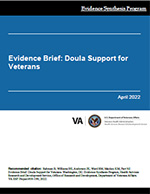
Recommended Citation:
Rahman B, Williams BE, Anderson JK, Ward RM, Mackey KM, Parr NJ. Evidence Brief: Doula Support for Veterans. Washington, DC: Evidence Synthesis Program, Health Services Research and Development Service, Office of Research and Development, Department of Veterans Affairs. VA ESP Project #09-199; 2022.
Download PDF: Brief, Supplemental Materials
Trained doula support for pregnant individuals may be associated with reduced cesarean births, shorter duration of labor, higher 5-min Apgar, higher birthweights and fewer NICU admissions. Doula support, regardless of training level, was not associated with any maternal or infant harms. Limitations of the evidence include wide variation in study methods and interventions, reducing the ability to compare findings across studies.
Incorporating trained doulas into maternity care services for pregnant Veterans has the potential to improve maternal, infant, and delivery outcomes by providing physical, emotional and educational support throughout pregnancy and delivery. This rapid review aimed to synthesize available evidence on the benefits and harms of doula support interventions in order to inform VHA leadership.
We identified 41 relevant studies including 22 RCTs related to doula and continuous birth companion support. We synthesized evidence by outcome and level of doula training. We have moderate confidence that trained doula support is associated with reduced cesarean births, shorter duration of labor, higher 5-min Apgar, higher birthweights and fewer NICU admissions and low confidence that trained doula support is associated with harms such as maternal and infant mortality. Support of a layperson as doula with minimal training was also associated with outcomes such as shorter labor, reduced labor pain, and high 5-min Apgar, although our confidence in these findings is low. No evidence of harms of doula support or support by layperson companionship during labor were identified. The evidence on doula support is generally limited by inconsistency in study methodologies and intervention definitions, and future research to identify key program components and optimal intervention characteristics is warranted.